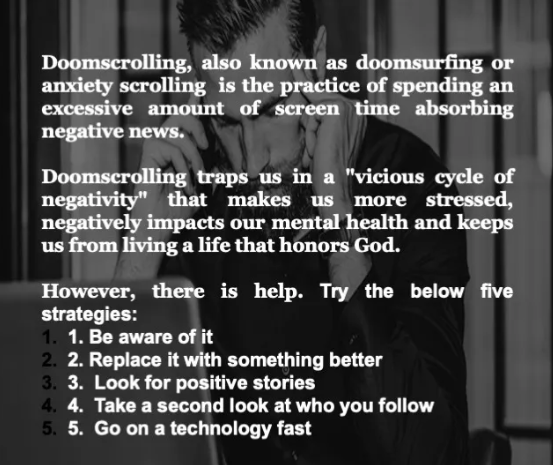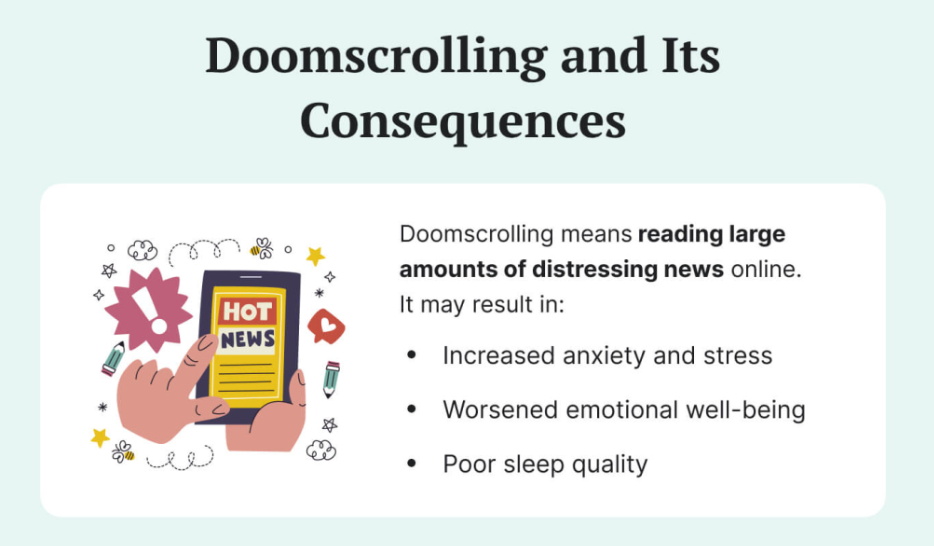Doomscrolling Is Destroying Your Mind: Shocking Truth Backed by Psychology — this headline isn’t just dramatic. It’s a real psychological concern affecting millions of Americans daily as they scroll endlessly through negative headlines.
What Is Doomscrolling and Why Is It So Common?
Doomscrolling refers to the habit of continuously scrolling through bad news, even when it causes distress. It often occurs late at night or during breaks, especially on social media platforms like Facebook, X (Twitter), Instagram, or YouTube.

Why Does It Happen?
Our brains have a “negativity bias” — an evolutionary trait that keeps us alert to threats. This makes negative headlines more appealing and harder to ignore, which feeds into a loop of anxious behavior.
The Science Behind Doomscrolling: What Psychology Tells Us
Experts in behavioral science confirm that doomscrolling increases stress levels, disrupts sleep, and worsens mental health over time. In the digital age, we are bombarded with more negative information than any generation before.

Key Psychological Effects of Doomscrolling
| Psychological Effect | Impact on USA Readers |
|---|---|
| Anxiety & Stress | Elevated cortisol levels due to constant fear-based content |
| Sleep Disruption | Trouble falling or staying asleep after late-night news exposure |
| Depression Symptoms | Persistent sadness and lack of motivation from consuming bad news |
| Productivity Decline | Less focus, more distractions at work or in personal life |
| Social Withdrawal | Emotional exhaustion leads to isolation and disengagement |
The Real Impact in the U.S.: What the Data Says
A 2024 report from the Pew Research Center found that:
- 73% of American adults feel emotionally drained after browsing online news.
- 52% of Gen Z users report increased anxiety after nightly doomscrolling.
- In California, New York, and Texas, mental health clinics saw a 31% rise in stress-related consultations since 2022.
How Doomscrolling Impacts Sleep, Anxiety, and Daily Life
Doomscrolling isn’t just an emotional drain — it changes our daily behavior. People who doomscroll regularly are:
- More likely to experience insomnia
- Less productive at work
- More likely to report depressive thoughts
- Spending an average of 3.5 hours daily on negative content, according to data from UC Denver’s digital wellness study
How to Break the Doomscrolling Habit: Science-Based Solutions
Here’s what leading psychologists suggest to overcome doomscrolling:
A Mind Map of Actionable Solutions
┌────────────┐
│ Awareness │
└────┬───────┘
│
┌───────────────▼────────────────┐
│ Set Time Limits │
└────────────┬───────────────────┘
│
┌───────────▼─────────────┐
│ Curate News Sources │
└───────────┬─────────────┘
│
┌─────────────▼────────────────┐
│ Practice Digital Detox │
└─────────────┬────────────────┘
│
┌──────────▼───────────┐
│ Track Mood & Triggers│
└──────────────────────┘
Simple Daily Habits That Work
- Check news only once in the morning and once in the evening.
- Avoid news 1 hour before bedtime.
- Subscribe to balanced, credible sources, not sensational ones.
- Replace scrolling with reading books or meditating.
Final Thoughts: Protect Your Mental Space in a Noisy World
Doomscrolling is quietly becoming a national mental health issue in the U.S. But you have the power to change that. Limiting exposure to distressing content, setting boundaries, and prioritizing well-being can significantly reduce its impact.
By adopting a more mindful digital lifestyle, you take control — not the algorithm.
[USnewsSphere.com / HH.]





